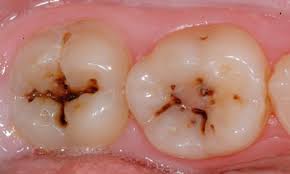caries
英 [ˈkeə.riːz]
美 [ˈker.iːz]
- n. [口腔] 龋齿;骨疡;骨溃疡

记忆方法
将“caries”分解记忆,可以将其看作是“car(e)”(车,代表移动)和“ies”的组合。想象一辆车(care)在牙齿(ies,类似于牙齿的排列)上移动,造成磨损或损害,从而联想到牙科用语“caries”表示蛀牙。
以上内容由AI生成, 仅供参考和借鉴
中文词源
caries 龋齿
来自PIE *sker, 砍,切,词源同caret,shear. 即缺了一块的牙齿。
英语词源
- caries (n.)
- 1630s, from Latin caries "rottenness, decay," from Proto-Italic *kas-, usually said to be from PIE root *kere- "to injure, break apart" (cognates: Greek ker "death, destruction," Old Irish krin "withered, faded"). Related: Carious. But de Vaan writes that "semantically, caries may just as well belong to careocared 'to lack' as 'defect, state of defectiveness' ...."
权威例句
- 1. Meanwhile, the anti - plaque actives, anti - caries actives and anti - tartar actives are also researched.
- 同时对抗牙斑活性物 、 抗 龋活性物及 抗 积石活性物进行了研究.
- 2. Objective To observe the curative effect of senile caries treated with FX.
- 目的观察FX玻璃 离子水门汀对老年龋病的治疗效果.
- 3. Caries are chronic infectious diseases and the consequence of oral ecologic disequilibrium.
- 龋病是慢性感染性疾病,是口腔生态平衡失调的结果.
- 4. Results Fluoridated milk had significant effects of remineralization , anti - demineralization and anti - caries.
- 利用偏光显微镜观察氟化牛奶和氟水的抗酸脱矿作用及 抗 龋作用.
- 5. Dental decay, also known as dental caries, begins first inside the tooth.
- 牙齿腐坏, 就是龋齿, 首先会减弱牙齿内的保护.